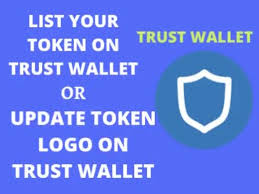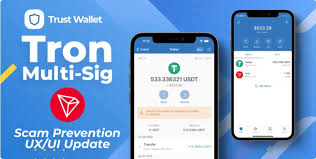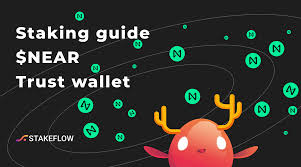
Yes, you can convert crypto to fiat and withdraw funds using third-party services like MoonPay or Simplex integrated within Trust Wallet.
How to Withdraw Cryptocurrency from Trust Wallet
How to Send Crypto from Trust Wallet to Another Wallet
-
Step 1: Open Trust Wallet: Launch the app and select the cryptocurrency you want to send.
-
Step 2: Tap “Send”: Click the “Send” button and enter the recipient’s wallet address. Ensure the address is correct to avoid mistakes.
-
Step 3: Enter the Amount: Specify the amount of cryptocurrency you want to send.
-
Step 4: Confirm and Send: Review the transaction details, including fees, and confirm the transaction. The crypto will be transferred to the recipient’s wallet.
What Are the Steps to Transfer Funds from Trust Wallet to a Bank Account?
-
Step 1: Convert Crypto to Fiat: Use third-party services integrated within Trust Wallet, like MoonPay or Simplex, to convert your cryptocurrency into fiat currency (e.g., USD, EUR).
-
Step 2: Choose Bank Account Withdrawal: After converting crypto to fiat, select the option to transfer funds to your bank account.
-
Step 3: Enter Bank Details: Provide your bank account details, such as account number and routing code, to complete the transfer.
-
Step 4: Confirm Transfer: Review the transaction, including any fees, and confirm the withdrawal. Funds will be transferred to your bank account once the transaction is processed.

Converting Crypto to Fiat Currency
How to Convert Cryptocurrency to Fiat Using Trust Wallet
-
Step 1: Open Trust Wallet: Launch the Trust Wallet app and select the cryptocurrency you wish to convert.
-
Step 2: Access the “Buy” Section: Navigate to the “Buy” tab within Trust Wallet and choose the “Sell” option for your crypto (if supported).
-
Step 3: Choose a Payment Method: Select the fiat currency (e.g., USD, EUR) you want to receive and choose a payment method such as a bank transfer or a credit/debit card.
-
Step 4: Complete the Transaction: Enter the amount you want to convert and confirm the transaction. The funds will be sent to your chosen payment method after processing.
Third-Party Services for Converting Crypto to Cash
-
MoonPay: A popular service integrated within Trust Wallet that allows users to convert cryptocurrencies to fiat currency and receive it via bank transfer, credit/debit cards, or other payment methods.
-
Simplex: Another trusted partner for converting crypto to fiat, offering direct fiat withdrawals to a bank account or card after conversion.
-
Banxa: Banxa also facilitates the conversion of crypto to fiat, providing users with an easy option for withdrawing funds directly to their bank accounts or cards.
-
Other Platforms: Platforms like Coinmama and Changelly also enable seamless conversions between cryptocurrencies and fiat currencies, which can be accessed directly through Trust Wallet.

Using Trust Wallet for Peer-to-Peer Transactions
How to Send Money to Others Using Trust Wallet
-
Step 1: Open Trust Wallet: Launch Trust Wallet and select the cryptocurrency you wish to send.
-
Step 2: Tap “Send”: In the wallet section of the selected cryptocurrency, click the “Send” button.
-
Step 3: Enter the Recipient’s Address: Copy and paste the recipient’s wallet address or use the QR code to scan the address.
-
Step 4: Specify the Amount: Enter the amount you want to send and review the transaction details, including any network fees.
-
Step 5: Confirm the Transaction: After verifying all the details, tap “Confirm” to send the cryptocurrency. The transaction will be processed and transferred to the recipient’s wallet.
Can I Receive Payments in Fiat from Trust Wallet?
-
Using Third-Party Services: Trust Wallet does not directly support fiat deposits. However, you can convert cryptocurrency into fiat using integrated third-party services like MoonPay or Simplex, which allow you to sell crypto and receive fiat through a bank account or debit/credit card.
-
Peer-to-Peer Transactions: If you’re involved in a peer-to-peer (P2P) network, you can receive crypto payments and convert them into fiat using external services outside of Trust Wallet. To get fiat payments directly, you will need to use other platforms that support P2P fiat transactions, such as Binance or LocalBitcoins.
Earning via Staking or Yield Farming
How to Earn Passive Income Through Staking in Trust Wallet
-
Step 1: Choose a Stakable Coin: Trust Wallet supports staking for several cryptocurrencies like Binance Coin (BNB), Tezos (XTZ), and Cosmos (ATOM). Select the coin you want to stake.
-
Step 2: Open the Staking Section: In Trust Wallet, go to the selected cryptocurrency and tap on the “Stake” button.
-
Step 3: Select a Validator: Pick a validator that will handle staking for the network. Validators help secure the network in exchange for rewards.
-
Step 4: Specify the Amount: Enter the amount of cryptocurrency you want to stake and confirm the transaction.
-
Step 5: Earn Rewards: Once your coins are staked, you will start earning rewards, which are paid periodically based on the amount and duration of the stake.
How Can I Access Yield Farming Opportunities Using Trust Wallet?
-
Step 1: Use Trust Wallet’s DApp Browser: Open the Trust Wallet app and access the DApp Browser to explore decentralized finance (DeFi) platforms like PancakeSwap, Uniswap, or Aave.
-
Step 2: Choose a Yield Farming Platform: On the DApp browser, select a yield farming platform where you can provide liquidity and earn rewards. These platforms often offer higher returns in exchange for providing liquidity to trading pairs.
-
Step 3: Provide Liquidity: After connecting your Trust Wallet to the platform, select a liquidity pool, deposit your crypto (e.g., stablecoins or tokens), and start earning yield from trading fees and rewards.
-
Step 4: Track Your Earnings: Trust Wallet allows you to track your staked or liquidity-provided assets and monitor the earnings from yield farming directly within the app.

Trading Crypto from Trust Wallet to Other Platforms
How to Transfer Cryptocurrency to an Exchange for Trading
-
Step 1: Open Trust Wallet: Launch the Trust Wallet app and select the cryptocurrency you want to transfer to an exchange.
-
Step 2: Tap “Send”: Tap on the “Send” button for the selected cryptocurrency and enter the exchange’s wallet address.
-
Step 3: Enter the Amount: Specify the amount of cryptocurrency you want to transfer and review the details.
-
Step 4: Confirm the Transfer: Double-check the address and transaction details before confirming. The cryptocurrency will be transferred to your exchange account once the transaction is processed.
Can I Trade Directly Within Trust Wallet for Profits?
-
Yes, You Can: Trust Wallet offers a built-in decentralized exchange (DEX) that allows users to swap and trade tokens directly within the app. You can exchange cryptocurrencies like Bitcoin, Ethereum, and Binance Coin without leaving the wallet.
-
Token Swaps: The wallet supports token swaps using decentralized platforms like PancakeSwap or Uniswap. You can trade different tokens and potentially profit from market fluctuations.
-
Transaction Fees: Keep in mind that when trading directly within Trust Wallet, you will need to pay network transaction fees, which can vary depending on the blockchain and token being traded.

Accessing Airdrops and Token Rewards
How to Claim Free Tokens or Airdrops from Trust Wallet
-
Step 1: Stay Updated on Airdrops: Monitor crypto news websites, social media, and airdrop platforms to stay informed about available airdrops.
-
Step 2: Register for Airdrops: Most airdrops require registration. Follow the instructions, which often involve joining a Telegram group, completing a form, or performing simple tasks like social media sharing.
-
Step 3: Receive Airdropped Tokens: Once the airdrop is distributed, the tokens will automatically be sent to your Trust Wallet address. Ensure your wallet supports the specific airdropped token.
-
Step 4: Monitor the Tokens: After receiving the airdrop, you can view the tokens in your Trust Wallet. If they don’t appear, add the token manually by using the token’s contract address.
How Can I Convert Airdrop Tokens into Cash?
-
Step 1: Check Exchange Support: Ensure that the airdropped token is listed on exchanges that support fiat withdrawals, like Binance, Coinbase, or Kraken.
-
Step 2: Transfer Tokens to an Exchange: Send the airdropped tokens from Trust Wallet to the exchange by copying the exchange wallet address and pasting it into Trust Wallet’s “Send” option.
-
Step 3: Sell the Tokens: Once your tokens are on the exchange, sell them for fiat currency like USD, EUR, or other supported currencies.
-
Step 4: Withdraw to Bank: After selling your tokens, withdraw the fiat currency to your linked bank account.

Trust Wallet’s Payment Methods and Fees
What Are the Withdrawal Fees Associated with Trust Wallet?
-
Trust Wallet doesn’t charge withdrawal fees, but network transaction fees (gas fees) apply, set by the respective blockchain networks.
Are There Any Hidden Costs When Sending or Converting Crypto on Trust Wallet?
-
Network Fees: Trust Wallet doesn’t impose hidden fees, but blockchain transaction fees apply, which can vary based on network congestion.
-
Third-Party Service Fees: When using services like MoonPay or Simplex for fiat-to-crypto transactions, additional fees may be charged by those platforms.
How can I withdraw funds from Trust Wallet?
You can withdraw funds by converting crypto to fiat through third-party services like MoonPay or Simplex, then transferring to your bank account.
Can I convert cryptocurrency to fiat within Trust Wallet?
Yes, Trust Wallet allows you to convert cryptocurrency to fiat using integrated services like MoonPay or Simplex.
Are there withdrawal fees when transferring money from Trust Wallet?
Trust Wallet doesn’t charge withdrawal fees, but network transaction fees (gas fees) apply when transferring crypto.
Leave a Reply